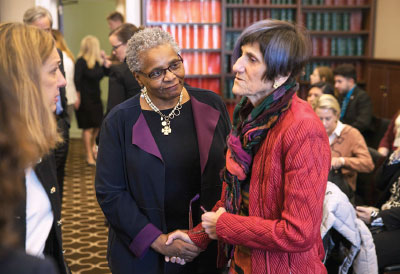Children Separated From Families at Border Need Trauma-Informed Care, Says APA President
Abstract
APA President Altha Stewart, M.D., testified before Congress about the mental health impact on children of being separated from their families at the border and their detention in prison-like facilities.
Children separated from their families at the border suffer from “toxic stress,” and some of these children will be significantly impaired for the rest of their lives, APA President Altha Stewart, M.D., testified on behalf of APA before a House Appropriations subcommittee last month.

Altha Stewart, M.D., greets Rosa DeLauro (D-Conn.). Both women are seeking quick reunification with family members for the 15,000 migrant children in detention.
Some of the factors that influence the children’s long-term outcomes are age, previous adversity, and the duration of the separation, Stewart said.
More than 2,700 children were separated from their families in 2018, according to the government, but thousands more may have been separated in the months before the official policy was announced, starting in 2017, according to a report by the Health and Human Services’ Office of the Inspector General.
APA was among the first organizations to speak out last spring when it became clear that the administration’s “zero tolerance” policy of referring those crossing the border for federal criminal prosecution would result in the widespread separation of children and families.
“As the physician experts in mental health, we will continue to oppose such family separation policies,” Stewart said. “Children depend on their parents or other trusted adults for their comfort, safety, and support. Any forced separation is highly stressful for children and can cause lifelong trauma, as well as increased risk of mental illness, such as depression, anxiety, substance use, and posttraumatic stress disorder.”
Stewart further pointed out at the hearing, held by the Subcommittee on Labor, Health and Human Services, Education, and Related Agencies, that the children need to be provided with trauma-informed care and access to services and supports for their clinical care during their separation and after reunification with their families. Trauma-informed care, she said, shifts the dialogue from asking “What’s wrong with you?” to “What has happened to you?”
Stewart also explained the concept of Adverse Childhood Experiences (ACEs) and the longstanding body of research about their impact on future health status. Examples of ACEs are physical, sexual, or emotional abuse or neglect; household exposure to mental illness or substance use disorder in parents and caregivers; and incarceration itself.
“When children are exposed to such chronic stress and trauma, their underdeveloped brain remains in a very elevated state, and ultimately this consistent exposure to this heightened stress and trauma changes their emotional, behavioral, and cognitive functioning,” said Stewart.
The Flores agreement and subsequent court rulings require the federal government to promptly place detained immigrant children in the least restrictive setting that is in the best interest of the child. Subcommittee Chair Rep. Rosa DeLauro (D-Conn.) said, “The administration should be quickly placing these children in safe, supportive homes with family members. Executing this lawful mission has not been this administration’s approach, however. Instead, it has attempted to turn Health and Human Services into an immigration enforcement agency.”
As of last December, 15,000 unaccompanied children were being detained, representing an all-time high, DeLauro said. In fact, tens of thousands of children have been held for many months, and the average length of child detentions has nearly tripled during the Trump administration, to nearly 90 days this year, she said.
Other panelists described the conditions for detained children. Michelle Brané, director of the Migrant Rights and Justice Program at the Women’s Refugee Commission, decried the administration’s shift away from the small, homelike shelters run by nonprofits to “very large institutional settings with very large profit margins.” Brané added, “No facility of this size is appropriate for children.”
DeLauro said the government pays $775 per child a day for stays at Homestead, which amounts to an average of nearly $55,000 each.
Homestead houses up to 2,350 children at one time, with some rooms holding as many as 200 children, testified Jonathan J. Mulligan, a clinical fellow at the UC Davis School of Law’s Immigration Law Clinic. Although it has been operating for more than one year, its designation as a “temporary” shelter exempts it from meeting auditing or licensing requirements. “It does not meet standards of care,” Mulligan said of Homestead, adding that recent news reports alleged that children have been subjected to sexual abuse at the facility.
Mulligan said children there are denied basic freedom of movement and are escorted at all times, even to the bathroom. Siblings are separated from one another, with only one brief sibling visit permitted a week. They are unable to study because the noise level is so high, and the tents are kept at chilling temperatures, supposedly to stop the spread of germs, Mulligan said. “Kids are freezing all day.”
Compounding all of these problems, stateside family members are no longer applying to sponsor the detained children and provide homes for them because of the administration’s new policy of using the information gleaned from such applications to deport or prosecute applicants for possible immigration violations, explained Jennifer Podkul, senior director of advocacy and policy at Kids in Need of Defense. In April 2018, the Office of Refugee Resettlement (ORR) finalized a memorandum of agreement with Immigration and Customs Enforcement to conduct background checks on potential sponsors of unaccompanied children, including fingerprinting all members of a sponsor’s household.
“ORR needs to stop sharing the immigration status information about potential sponsors so we can find these children safe homes and prioritize child welfare over immigration enforcement.” ■
Stewart’s written testimony can be accessed here.



